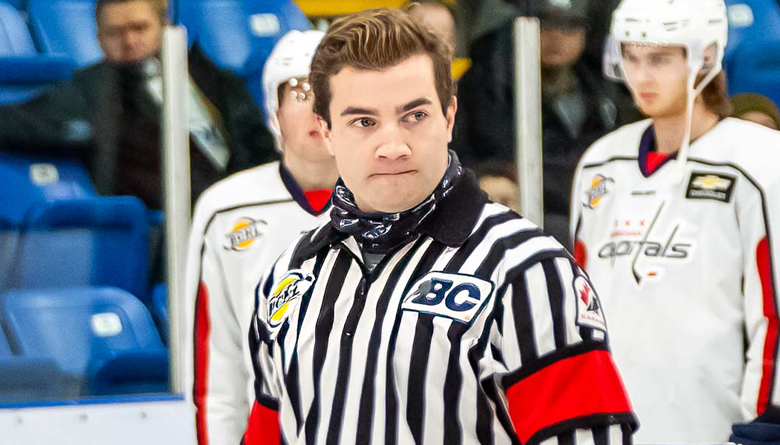Photo credit: Chaisson Creative
To say the last eight months have been challenging for BCHL official Braiden Epp is a massive understatement.
The 25-year-old from Prince George, B.C., who is also a former BCHL player, had his life turned upside down last May when he noticed a strange sensation his legs while refereeing games in the league’s pod season. Epp was part of the crew handling games in the Port Alberni Pod and near the end of the season, he started to feel significant fatigue in his legs, which was uncommon since he has been on skates for most of his life.
The problem persisted and he understandably became concerned. Something felt wrong. After being turned away on two separate occasions at a walk-in clinic, Epp decided enough was enough and he drove himself to the hospital in Nanaimo where he currently resides while he continues his studies as a fourth-year kinesiology student at Vancouver Island University. He was able to see a neurologist that night and, after a week of tests, they confirmed his suspicions that something was indeed wrong.
On May 25, 2021, at just 24-years-old, he was diagnosed with multiple sclerosis.
Multiple sclerosis, or MS, is a disorder that causes communication problems between the brain and the rest of the body. Although there is not one single thing that occurs for all people living with MS, Epp experiences some of the more common symptoms like fatigue, numbness and tingling in the extremities. Brain fog is another issue that has come up for him as well.
Needless to say, the diagnosis changed a lot of things in his life. He had to put the officiating on hold. He was not able to work at all for a period of time. But, being the competitor and positive person that he is, his focus immediately shifted to thinking about how he could spin this into something good.
“I always like to take things as a challenge,” he said. “I’m not going to pout about it. I thought, ‘let’s raise some awareness.'”
He not only raised awareness, he raised a significant amount of money for MS programs and services as well.
It just so happened that five days after his diagnosis, the MS Society of Canada’s MS Walk was set to take place. True to his word, he did not pout about it and he sprung into action.
With the help of a social media campaign, in the five days between his diagnosis and the walk, Epp, along with family and friends, raised over $30,000.
“We just had so much support over that week,” he said. “It was truly amazing to have that kind of support.”
Another goal that he quickly set was to return to the ice and officiate in the BCHL again. He knew it would take time, but it is something he always thought was within reach.
 Despite experiencing setbacks and challenges along the way, less than eight months after his diagnosis, Epp returned to the BCHL to referee a game on Saturday, Jan. 15. The game was between the Cowichan Valley Capitals and the Alberni Valley Bulldogs, played in Port Alberni, which is where this whole ordeal started.
Despite experiencing setbacks and challenges along the way, less than eight months after his diagnosis, Epp returned to the BCHL to referee a game on Saturday, Jan. 15. The game was between the Cowichan Valley Capitals and the Alberni Valley Bulldogs, played in Port Alberni, which is where this whole ordeal started.
Things had really come full circle.
“I had this marked on my calendar since I was assigned the game,” said Epp. “As the day got closer, I got more and more nervous. It felt like I was reffing in the NHL, that’s how big of a deal it was for me. There were so many nerves. I was worried. I was scared. All the emotions you could think of, I was going through it.”
Not only was it important for Epp to get back in the game, it was important to the BC Hockey League.
“I am really excited to see Braiden back on the ice officiating in the BCHL,” said the league’s Director of Officiating and Player Safety Brad Lazarowich. “He is a solid referee who has taken some time off to get himself mentally and physically prepared for the challenges ahead. I’m proud of him and know our teams are happy to have him back.”
Over the past eight months, things have been challenging for Epp. MS is not behind him. According him, the medication he is on is not designed to make him better, it just makes sure things do not get any worse. And he is okay with that. This is something he will deal with for the rest of his life.
Throughout it all, his approach has been to stay positive. Given what he has already accomplished in less than a year since his diagnosis, it seems to be working for him.
“Being positive really goes a long way,” he said. “You’ve got people in your corner at all times. Just be positive and take it one step at a time. There’s always good you can do. Keep being positive and keep working hard.
















































